Organizational Theory: Classical and Neo-classical Approach
VerifiedAdded on 2023/01/13
|12
|2503
|48
AI Summary
This document discusses the classical and neo-classical approaches to management, including scientific management, principles of organization, and bureaucracy theory. It also explores the forces that will shape companies and their structures in the future, such as technological advancements and changing workforce culture. Additionally, it discusses theories that will shape the future of companies, including customer-oriented approach, culture-excellence approach, and the Japanese approach.
Contribute Materials
Your contribution can guide someone’s learning journey. Share your
documents today.
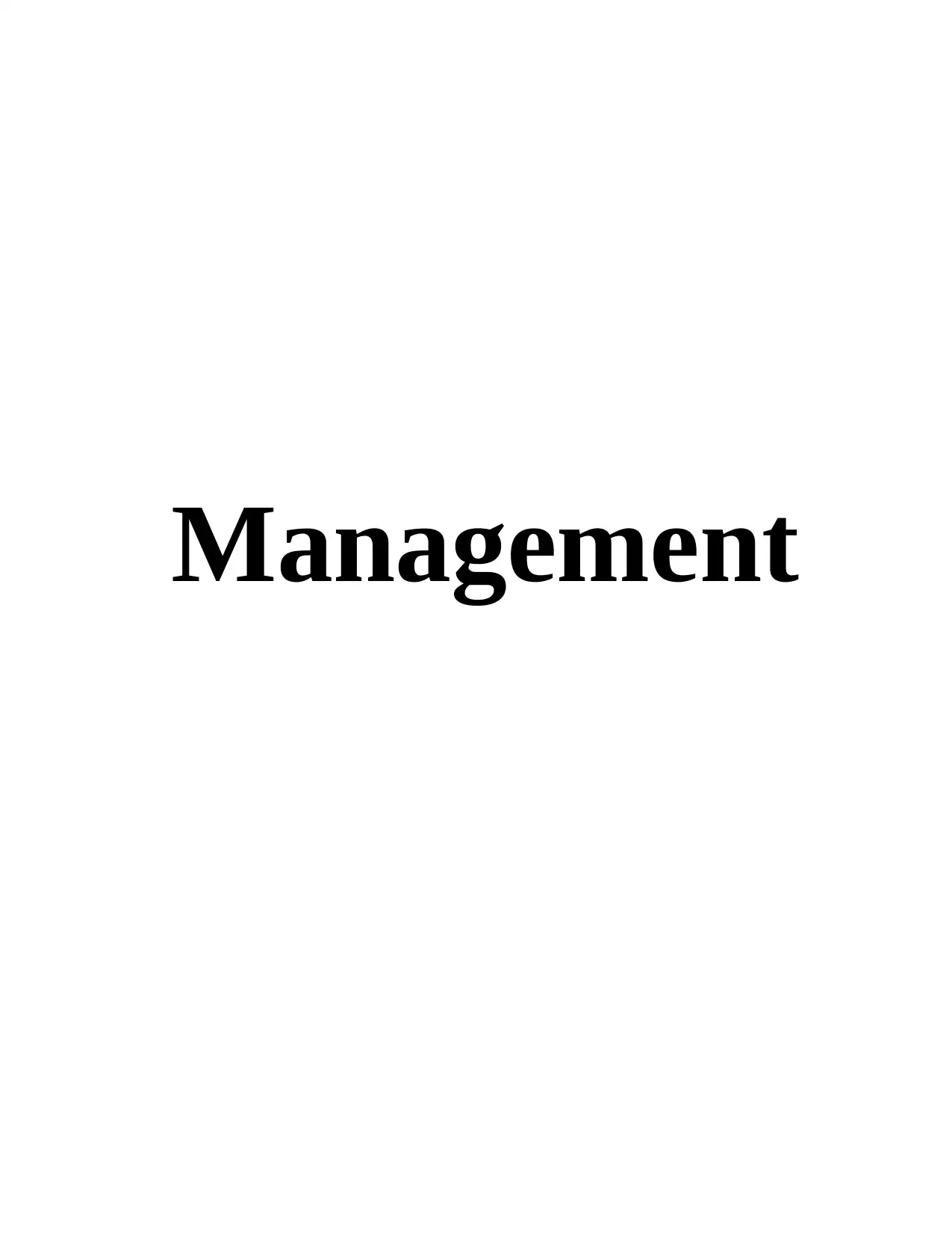
Management
Secure Best Marks with AI Grader
Need help grading? Try our AI Grader for instant feedback on your assignments.
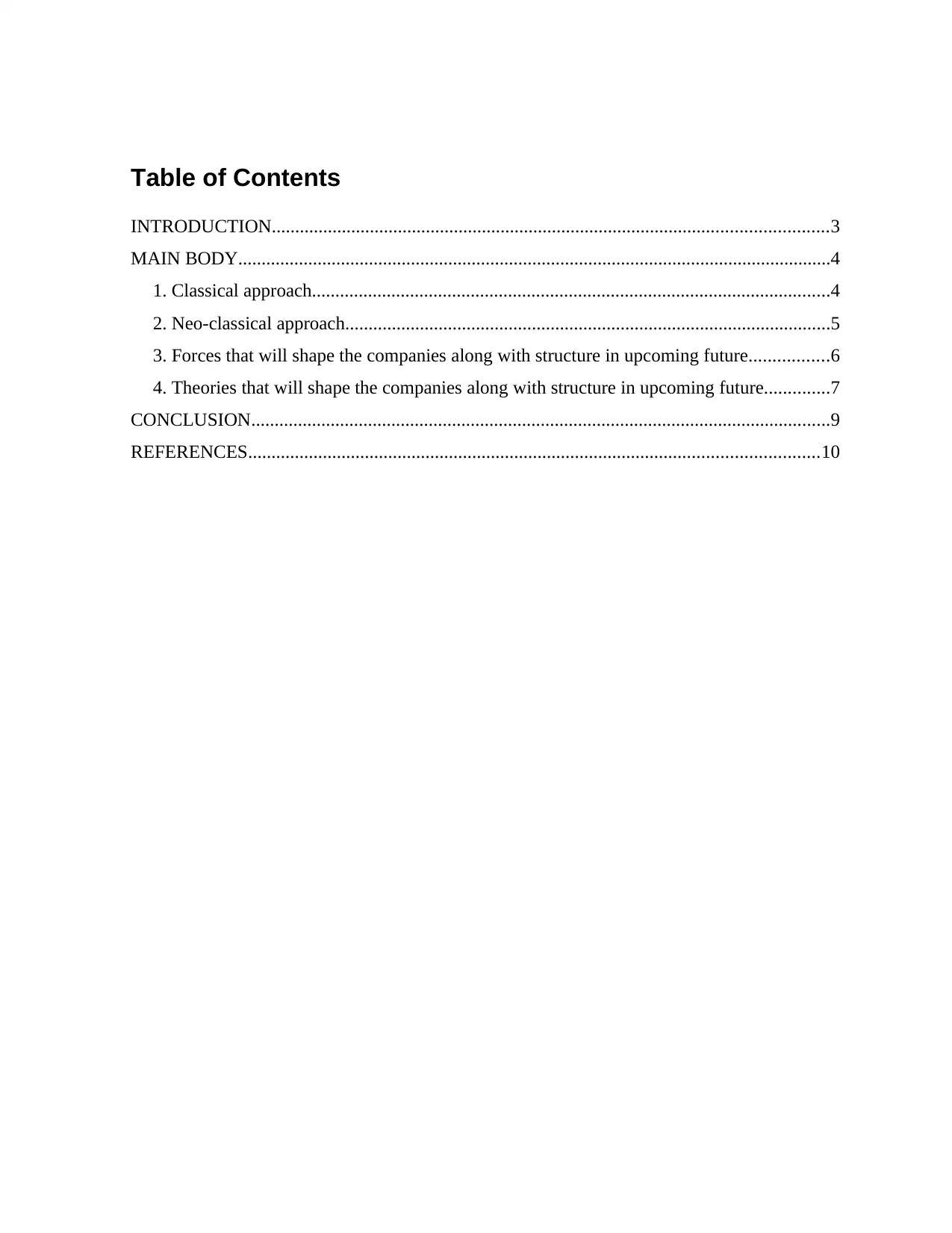
Table of Contents
INTRODUCTION.......................................................................................................................3
MAIN BODY...............................................................................................................................4
1. Classical approach...............................................................................................................4
2. Neo-classical approach........................................................................................................5
3. Forces that will shape the companies along with structure in upcoming future.................6
4. Theories that will shape the companies along with structure in upcoming future..............7
CONCLUSION............................................................................................................................9
REFERENCES..........................................................................................................................10
INTRODUCTION.......................................................................................................................3
MAIN BODY...............................................................................................................................4
1. Classical approach...............................................................................................................4
2. Neo-classical approach........................................................................................................5
3. Forces that will shape the companies along with structure in upcoming future.................6
4. Theories that will shape the companies along with structure in upcoming future..............7
CONCLUSION............................................................................................................................9
REFERENCES..........................................................................................................................10

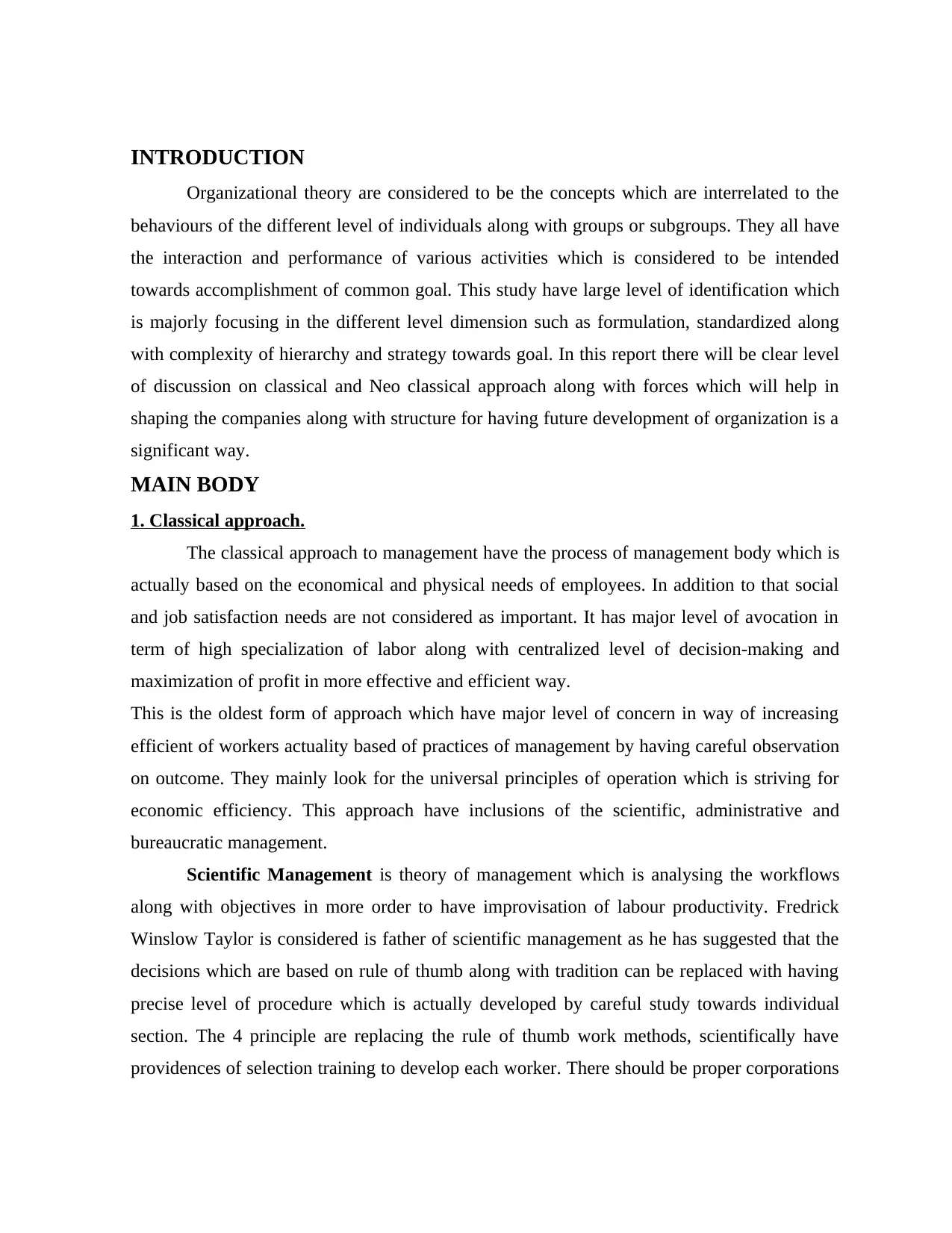
INTRODUCTION
Organizational theory are considered to be the concepts which are interrelated to the
behaviours of the different level of individuals along with groups or subgroups. They all have
the interaction and performance of various activities which is considered to be intended
towards accomplishment of common goal. This study have large level of identification which
is majorly focusing in the different level dimension such as formulation, standardized along
with complexity of hierarchy and strategy towards goal. In this report there will be clear level
of discussion on classical and Neo classical approach along with forces which will help in
shaping the companies along with structure for having future development of organization is a
significant way.
MAIN BODY
1. Classical approach.
The classical approach to management have the process of management body which is
actually based on the economical and physical needs of employees. In addition to that social
and job satisfaction needs are not considered as important. It has major level of avocation in
term of high specialization of labor along with centralized level of decision-making and
maximization of profit in more effective and efficient way.
This is the oldest form of approach which have major level of concern in way of increasing
efficient of workers actuality based of practices of management by having careful observation
on outcome. They mainly look for the universal principles of operation which is striving for
economic efficiency. This approach have inclusions of the scientific, administrative and
bureaucratic management.
Scientific Management is theory of management which is analysing the workflows
along with objectives in more order to have improvisation of labour productivity. Fredrick
Winslow Taylor is considered is father of scientific management as he has suggested that the
decisions which are based on rule of thumb along with tradition can be replaced with having
precise level of procedure which is actually developed by careful study towards individual
section. The 4 principle are replacing the rule of thumb work methods, scientifically have
providences of selection training to develop each worker. There should be proper corporations
Organizational theory are considered to be the concepts which are interrelated to the
behaviours of the different level of individuals along with groups or subgroups. They all have
the interaction and performance of various activities which is considered to be intended
towards accomplishment of common goal. This study have large level of identification which
is majorly focusing in the different level dimension such as formulation, standardized along
with complexity of hierarchy and strategy towards goal. In this report there will be clear level
of discussion on classical and Neo classical approach along with forces which will help in
shaping the companies along with structure for having future development of organization is a
significant way.
MAIN BODY
1. Classical approach.
The classical approach to management have the process of management body which is
actually based on the economical and physical needs of employees. In addition to that social
and job satisfaction needs are not considered as important. It has major level of avocation in
term of high specialization of labor along with centralized level of decision-making and
maximization of profit in more effective and efficient way.
This is the oldest form of approach which have major level of concern in way of increasing
efficient of workers actuality based of practices of management by having careful observation
on outcome. They mainly look for the universal principles of operation which is striving for
economic efficiency. This approach have inclusions of the scientific, administrative and
bureaucratic management.
Scientific Management is theory of management which is analysing the workflows
along with objectives in more order to have improvisation of labour productivity. Fredrick
Winslow Taylor is considered is father of scientific management as he has suggested that the
decisions which are based on rule of thumb along with tradition can be replaced with having
precise level of procedure which is actually developed by careful study towards individual
section. The 4 principle are replacing the rule of thumb work methods, scientifically have
providences of selection training to develop each worker. There should be proper corporations
Secure Best Marks with AI Grader
Need help grading? Try our AI Grader for instant feedback on your assignments.
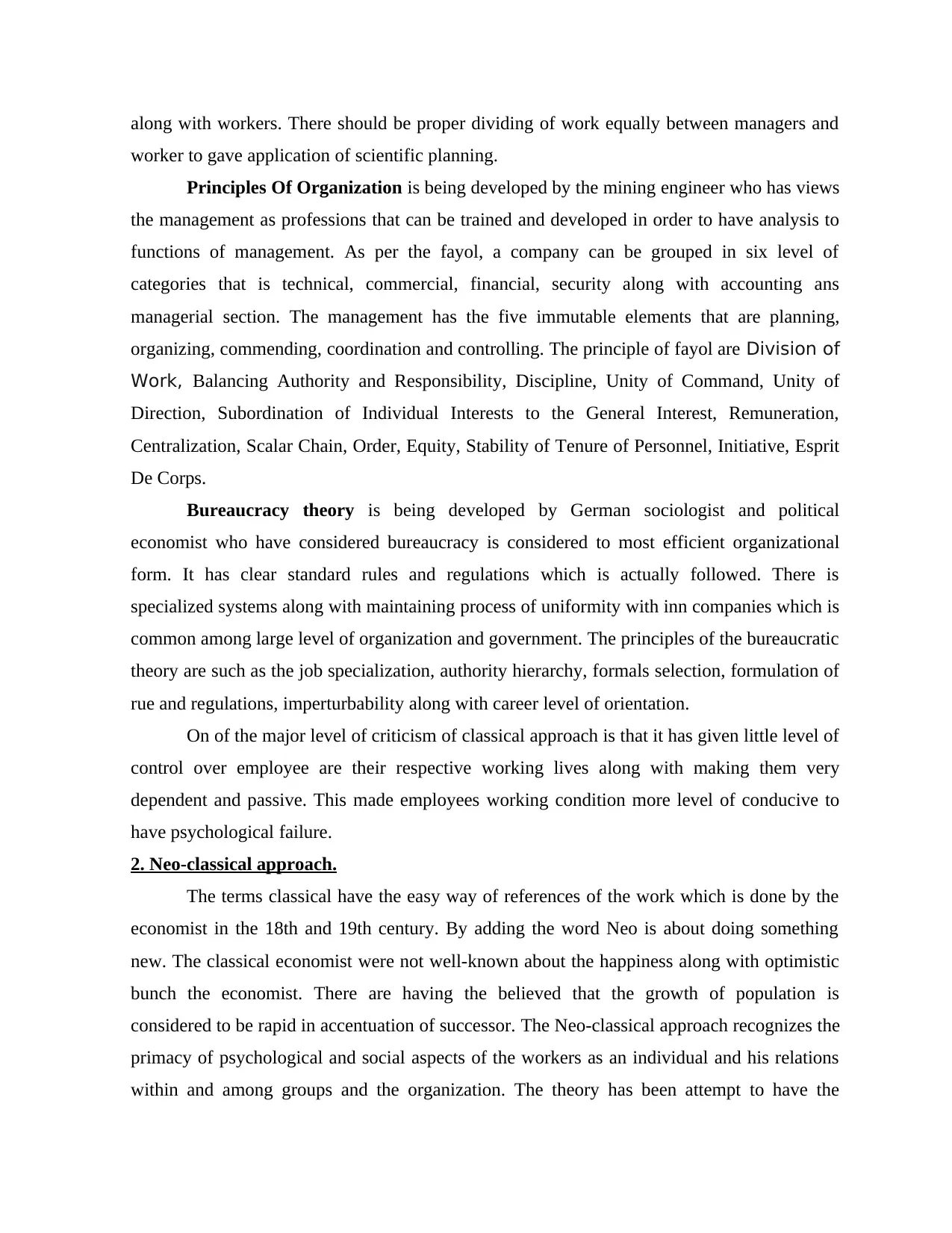
along with workers. There should be proper dividing of work equally between managers and
worker to gave application of scientific planning.
Principles Of Organization is being developed by the mining engineer who has views
the management as professions that can be trained and developed in order to have analysis to
functions of management. As per the fayol, a company can be grouped in six level of
categories that is technical, commercial, financial, security along with accounting ans
managerial section. The management has the five immutable elements that are planning,
organizing, commending, coordination and controlling. The principle of fayol are Division of
Work, Balancing Authority and Responsibility, Discipline, Unity of Command, Unity of
Direction, Subordination of Individual Interests to the General Interest, Remuneration,
Centralization, Scalar Chain, Order, Equity, Stability of Tenure of Personnel, Initiative, Esprit
De Corps.
Bureaucracy theory is being developed by German sociologist and political
economist who have considered bureaucracy is considered to most efficient organizational
form. It has clear standard rules and regulations which is actually followed. There is
specialized systems along with maintaining process of uniformity with inn companies which is
common among large level of organization and government. The principles of the bureaucratic
theory are such as the job specialization, authority hierarchy, formals selection, formulation of
rue and regulations, imperturbability along with career level of orientation.
On of the major level of criticism of classical approach is that it has given little level of
control over employee are their respective working lives along with making them very
dependent and passive. This made employees working condition more level of conducive to
have psychological failure.
2. Neo-classical approach.
The terms classical have the easy way of references of the work which is done by the
economist in the 18th and 19th century. By adding the word Neo is about doing something
new. The classical economist were not well-known about the happiness along with optimistic
bunch the economist. There are having the believed that the growth of population is
considered to be rapid in accentuation of successor. The Neo-classical approach recognizes the
primacy of psychological and social aspects of the workers as an individual and his relations
within and among groups and the organization. The theory has been attempt to have the
worker to gave application of scientific planning.
Principles Of Organization is being developed by the mining engineer who has views
the management as professions that can be trained and developed in order to have analysis to
functions of management. As per the fayol, a company can be grouped in six level of
categories that is technical, commercial, financial, security along with accounting ans
managerial section. The management has the five immutable elements that are planning,
organizing, commending, coordination and controlling. The principle of fayol are Division of
Work, Balancing Authority and Responsibility, Discipline, Unity of Command, Unity of
Direction, Subordination of Individual Interests to the General Interest, Remuneration,
Centralization, Scalar Chain, Order, Equity, Stability of Tenure of Personnel, Initiative, Esprit
De Corps.
Bureaucracy theory is being developed by German sociologist and political
economist who have considered bureaucracy is considered to most efficient organizational
form. It has clear standard rules and regulations which is actually followed. There is
specialized systems along with maintaining process of uniformity with inn companies which is
common among large level of organization and government. The principles of the bureaucratic
theory are such as the job specialization, authority hierarchy, formals selection, formulation of
rue and regulations, imperturbability along with career level of orientation.
On of the major level of criticism of classical approach is that it has given little level of
control over employee are their respective working lives along with making them very
dependent and passive. This made employees working condition more level of conducive to
have psychological failure.
2. Neo-classical approach.
The terms classical have the easy way of references of the work which is done by the
economist in the 18th and 19th century. By adding the word Neo is about doing something
new. The classical economist were not well-known about the happiness along with optimistic
bunch the economist. There are having the believed that the growth of population is
considered to be rapid in accentuation of successor. The Neo-classical approach recognizes the
primacy of psychological and social aspects of the workers as an individual and his relations
within and among groups and the organization. The theory has been attempt to have the
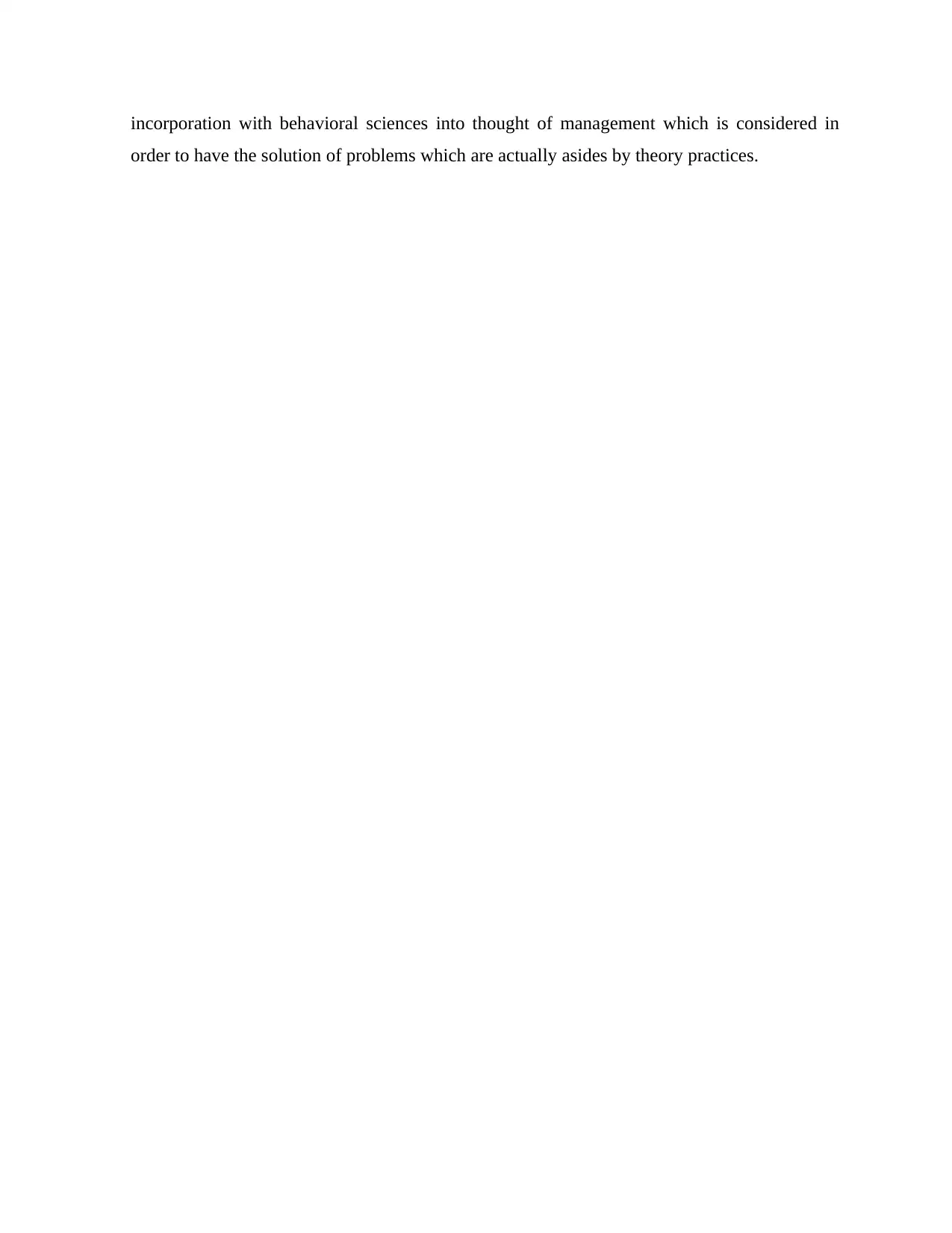
incorporation with behavioral sciences into thought of management which is considered in
order to have the solution of problems which are actually asides by theory practices.
order to have the solution of problems which are actually asides by theory practices.
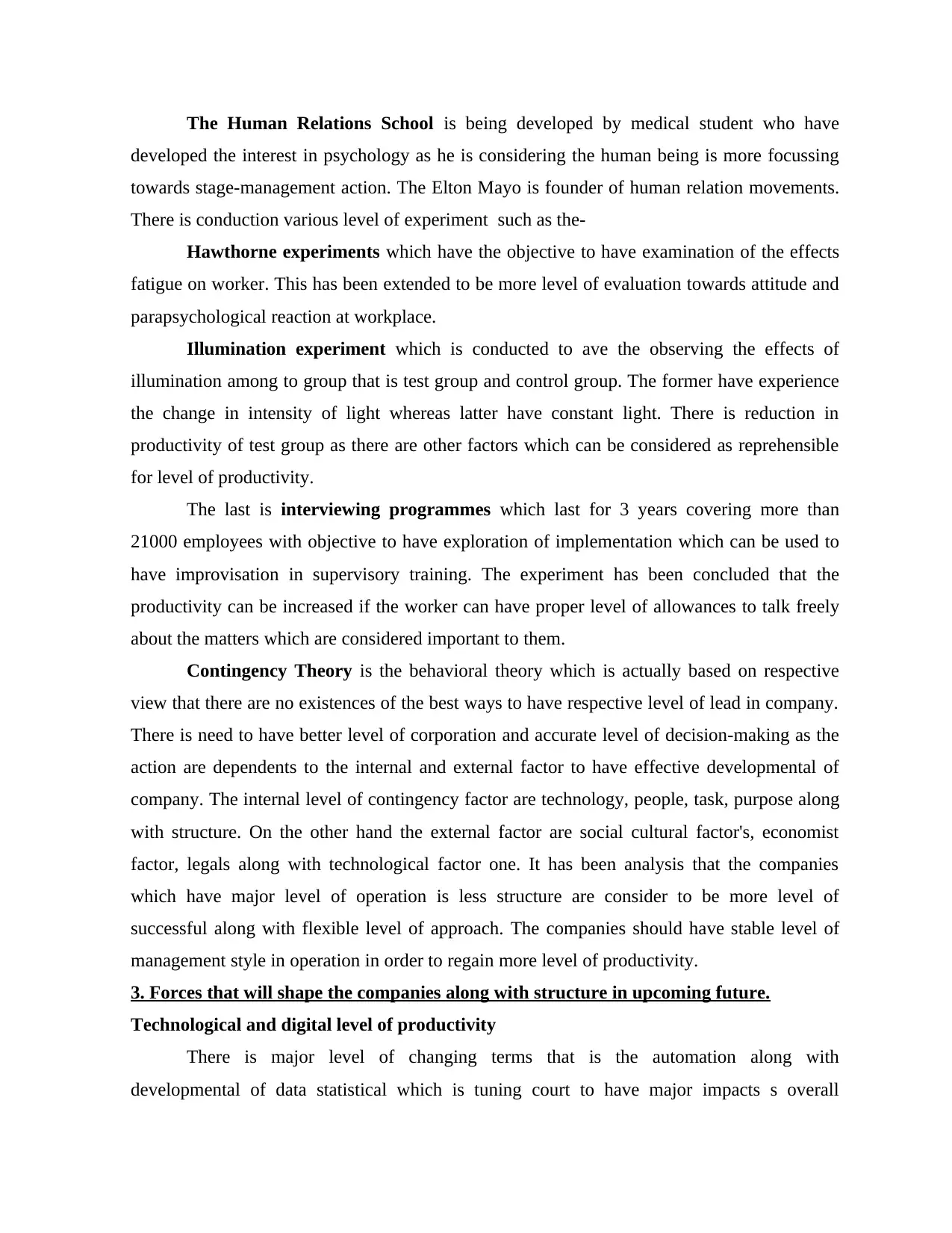
The Human Relations School is being developed by medical student who have
developed the interest in psychology as he is considering the human being is more focussing
towards stage-management action. The Elton Mayo is founder of human relation movements.
There is conduction various level of experiment such as the-
Hawthorne experiments which have the objective to have examination of the effects
fatigue on worker. This has been extended to be more level of evaluation towards attitude and
parapsychological reaction at workplace.
Illumination experiment which is conducted to ave the observing the effects of
illumination among to group that is test group and control group. The former have experience
the change in intensity of light whereas latter have constant light. There is reduction in
productivity of test group as there are other factors which can be considered as reprehensible
for level of productivity.
The last is interviewing programmes which last for 3 years covering more than
21000 employees with objective to have exploration of implementation which can be used to
have improvisation in supervisory training. The experiment has been concluded that the
productivity can be increased if the worker can have proper level of allowances to talk freely
about the matters which are considered important to them.
Contingency Theory is the behavioral theory which is actually based on respective
view that there are no existences of the best ways to have respective level of lead in company.
There is need to have better level of corporation and accurate level of decision-making as the
action are dependents to the internal and external factor to have effective developmental of
company. The internal level of contingency factor are technology, people, task, purpose along
with structure. On the other hand the external factor are social cultural factor's, economist
factor, legals along with technological factor one. It has been analysis that the companies
which have major level of operation is less structure are consider to be more level of
successful along with flexible level of approach. The companies should have stable level of
management style in operation in order to regain more level of productivity.
3. Forces that will shape the companies along with structure in upcoming future.
Technological and digital level of productivity
There is major level of changing terms that is the automation along with
developmental of data statistical which is tuning court to have major impacts s overall
developed the interest in psychology as he is considering the human being is more focussing
towards stage-management action. The Elton Mayo is founder of human relation movements.
There is conduction various level of experiment such as the-
Hawthorne experiments which have the objective to have examination of the effects
fatigue on worker. This has been extended to be more level of evaluation towards attitude and
parapsychological reaction at workplace.
Illumination experiment which is conducted to ave the observing the effects of
illumination among to group that is test group and control group. The former have experience
the change in intensity of light whereas latter have constant light. There is reduction in
productivity of test group as there are other factors which can be considered as reprehensible
for level of productivity.
The last is interviewing programmes which last for 3 years covering more than
21000 employees with objective to have exploration of implementation which can be used to
have improvisation in supervisory training. The experiment has been concluded that the
productivity can be increased if the worker can have proper level of allowances to talk freely
about the matters which are considered important to them.
Contingency Theory is the behavioral theory which is actually based on respective
view that there are no existences of the best ways to have respective level of lead in company.
There is need to have better level of corporation and accurate level of decision-making as the
action are dependents to the internal and external factor to have effective developmental of
company. The internal level of contingency factor are technology, people, task, purpose along
with structure. On the other hand the external factor are social cultural factor's, economist
factor, legals along with technological factor one. It has been analysis that the companies
which have major level of operation is less structure are consider to be more level of
successful along with flexible level of approach. The companies should have stable level of
management style in operation in order to regain more level of productivity.
3. Forces that will shape the companies along with structure in upcoming future.
Technological and digital level of productivity
There is major level of changing terms that is the automation along with
developmental of data statistical which is tuning court to have major impacts s overall
Paraphrase This Document
Need a fresh take? Get an instant paraphrase of this document with our AI Paraphraser
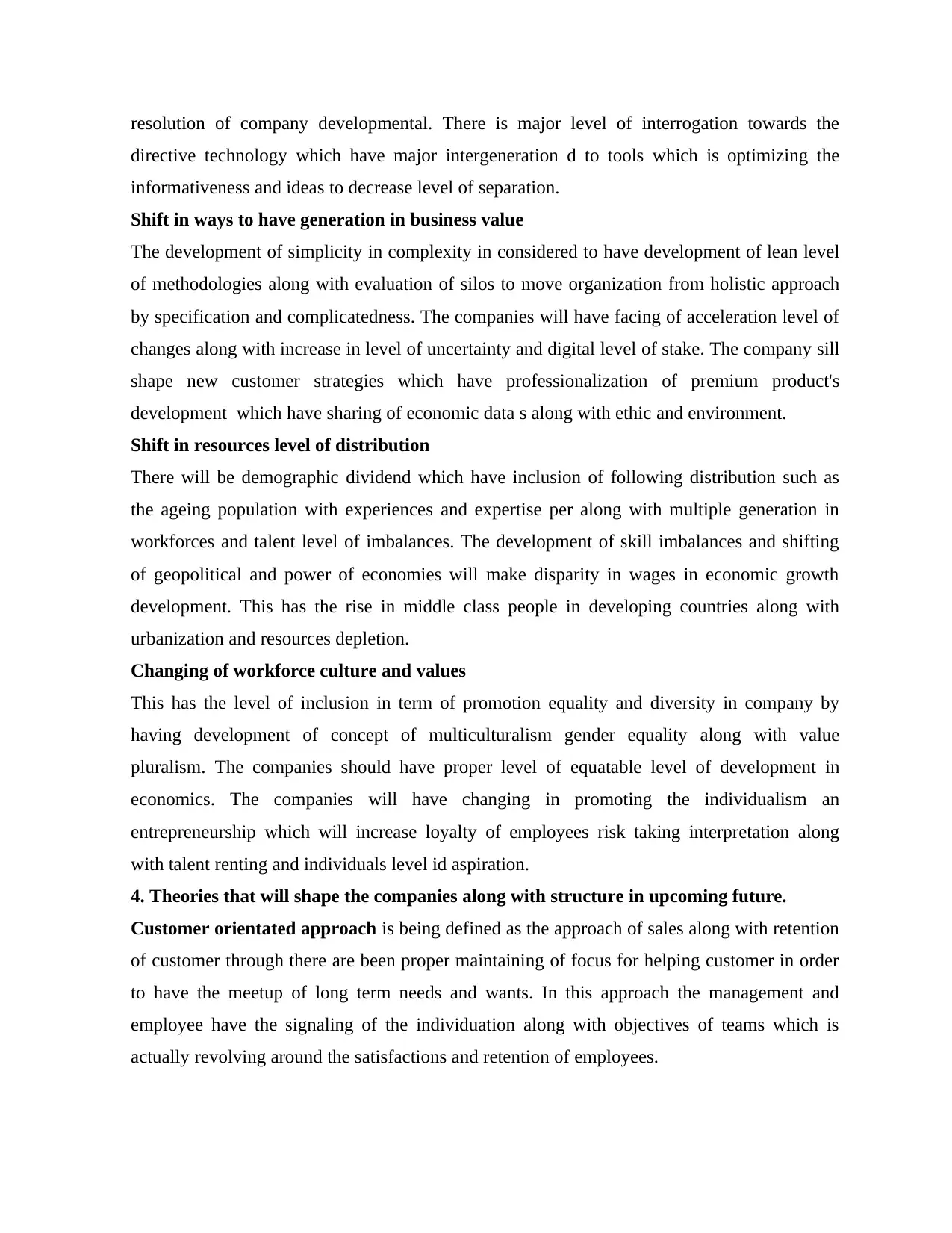
resolution of company developmental. There is major level of interrogation towards the
directive technology which have major intergeneration d to tools which is optimizing the
informativeness and ideas to decrease level of separation.
Shift in ways to have generation in business value
The development of simplicity in complexity in considered to have development of lean level
of methodologies along with evaluation of silos to move organization from holistic approach
by specification and complicatedness. The companies will have facing of acceleration level of
changes along with increase in level of uncertainty and digital level of stake. The company sill
shape new customer strategies which have professionalization of premium product's
development which have sharing of economic data s along with ethic and environment.
Shift in resources level of distribution
There will be demographic dividend which have inclusion of following distribution such as
the ageing population with experiences and expertise per along with multiple generation in
workforces and talent level of imbalances. The development of skill imbalances and shifting
of geopolitical and power of economies will make disparity in wages in economic growth
development. This has the rise in middle class people in developing countries along with
urbanization and resources depletion.
Changing of workforce culture and values
This has the level of inclusion in term of promotion equality and diversity in company by
having development of concept of multiculturalism gender equality along with value
pluralism. The companies should have proper level of equatable level of development in
economics. The companies will have changing in promoting the individualism an
entrepreneurship which will increase loyalty of employees risk taking interpretation along
with talent renting and individuals level id aspiration.
4. Theories that will shape the companies along with structure in upcoming future.
Customer orientated approach is being defined as the approach of sales along with retention
of customer through there are been proper maintaining of focus for helping customer in order
to have the meetup of long term needs and wants. In this approach the management and
employee have the signaling of the individuation along with objectives of teams which is
actually revolving around the satisfactions and retention of employees.
directive technology which have major intergeneration d to tools which is optimizing the
informativeness and ideas to decrease level of separation.
Shift in ways to have generation in business value
The development of simplicity in complexity in considered to have development of lean level
of methodologies along with evaluation of silos to move organization from holistic approach
by specification and complicatedness. The companies will have facing of acceleration level of
changes along with increase in level of uncertainty and digital level of stake. The company sill
shape new customer strategies which have professionalization of premium product's
development which have sharing of economic data s along with ethic and environment.
Shift in resources level of distribution
There will be demographic dividend which have inclusion of following distribution such as
the ageing population with experiences and expertise per along with multiple generation in
workforces and talent level of imbalances. The development of skill imbalances and shifting
of geopolitical and power of economies will make disparity in wages in economic growth
development. This has the rise in middle class people in developing countries along with
urbanization and resources depletion.
Changing of workforce culture and values
This has the level of inclusion in term of promotion equality and diversity in company by
having development of concept of multiculturalism gender equality along with value
pluralism. The companies should have proper level of equatable level of development in
economics. The companies will have changing in promoting the individualism an
entrepreneurship which will increase loyalty of employees risk taking interpretation along
with talent renting and individuals level id aspiration.
4. Theories that will shape the companies along with structure in upcoming future.
Customer orientated approach is being defined as the approach of sales along with retention
of customer through there are been proper maintaining of focus for helping customer in order
to have the meetup of long term needs and wants. In this approach the management and
employee have the signaling of the individuation along with objectives of teams which is
actually revolving around the satisfactions and retention of employees.
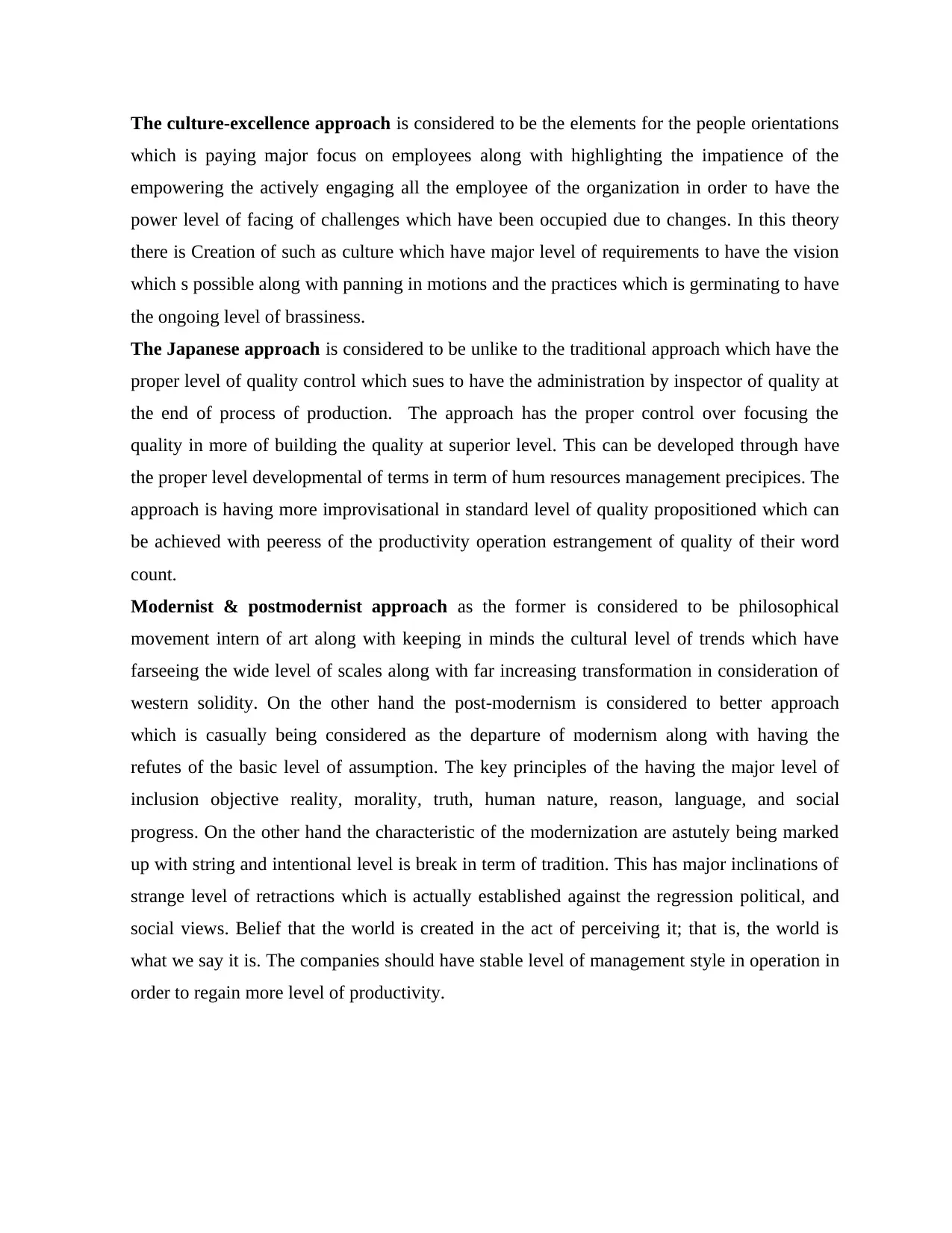
The culture-excellence approach is considered to be the elements for the people orientations
which is paying major focus on employees along with highlighting the impatience of the
empowering the actively engaging all the employee of the organization in order to have the
power level of facing of challenges which have been occupied due to changes. In this theory
there is Creation of such as culture which have major level of requirements to have the vision
which s possible along with panning in motions and the practices which is germinating to have
the ongoing level of brassiness.
The Japanese approach is considered to be unlike to the traditional approach which have the
proper level of quality control which sues to have the administration by inspector of quality at
the end of process of production. The approach has the proper control over focusing the
quality in more of building the quality at superior level. This can be developed through have
the proper level developmental of terms in term of hum resources management precipices. The
approach is having more improvisational in standard level of quality propositioned which can
be achieved with peeress of the productivity operation estrangement of quality of their word
count.
Modernist & postmodernist approach as the former is considered to be philosophical
movement intern of art along with keeping in minds the cultural level of trends which have
farseeing the wide level of scales along with far increasing transformation in consideration of
western solidity. On the other hand the post-modernism is considered to better approach
which is casually being considered as the departure of modernism along with having the
refutes of the basic level of assumption. The key principles of the having the major level of
inclusion objective reality, morality, truth, human nature, reason, language, and social
progress. On the other hand the characteristic of the modernization are astutely being marked
up with string and intentional level is break in term of tradition. This has major inclinations of
strange level of retractions which is actually established against the regression political, and
social views. Belief that the world is created in the act of perceiving it; that is, the world is
what we say it is. The companies should have stable level of management style in operation in
order to regain more level of productivity.
which is paying major focus on employees along with highlighting the impatience of the
empowering the actively engaging all the employee of the organization in order to have the
power level of facing of challenges which have been occupied due to changes. In this theory
there is Creation of such as culture which have major level of requirements to have the vision
which s possible along with panning in motions and the practices which is germinating to have
the ongoing level of brassiness.
The Japanese approach is considered to be unlike to the traditional approach which have the
proper level of quality control which sues to have the administration by inspector of quality at
the end of process of production. The approach has the proper control over focusing the
quality in more of building the quality at superior level. This can be developed through have
the proper level developmental of terms in term of hum resources management precipices. The
approach is having more improvisational in standard level of quality propositioned which can
be achieved with peeress of the productivity operation estrangement of quality of their word
count.
Modernist & postmodernist approach as the former is considered to be philosophical
movement intern of art along with keeping in minds the cultural level of trends which have
farseeing the wide level of scales along with far increasing transformation in consideration of
western solidity. On the other hand the post-modernism is considered to better approach
which is casually being considered as the departure of modernism along with having the
refutes of the basic level of assumption. The key principles of the having the major level of
inclusion objective reality, morality, truth, human nature, reason, language, and social
progress. On the other hand the characteristic of the modernization are astutely being marked
up with string and intentional level is break in term of tradition. This has major inclinations of
strange level of retractions which is actually established against the regression political, and
social views. Belief that the world is created in the act of perceiving it; that is, the world is
what we say it is. The companies should have stable level of management style in operation in
order to regain more level of productivity.
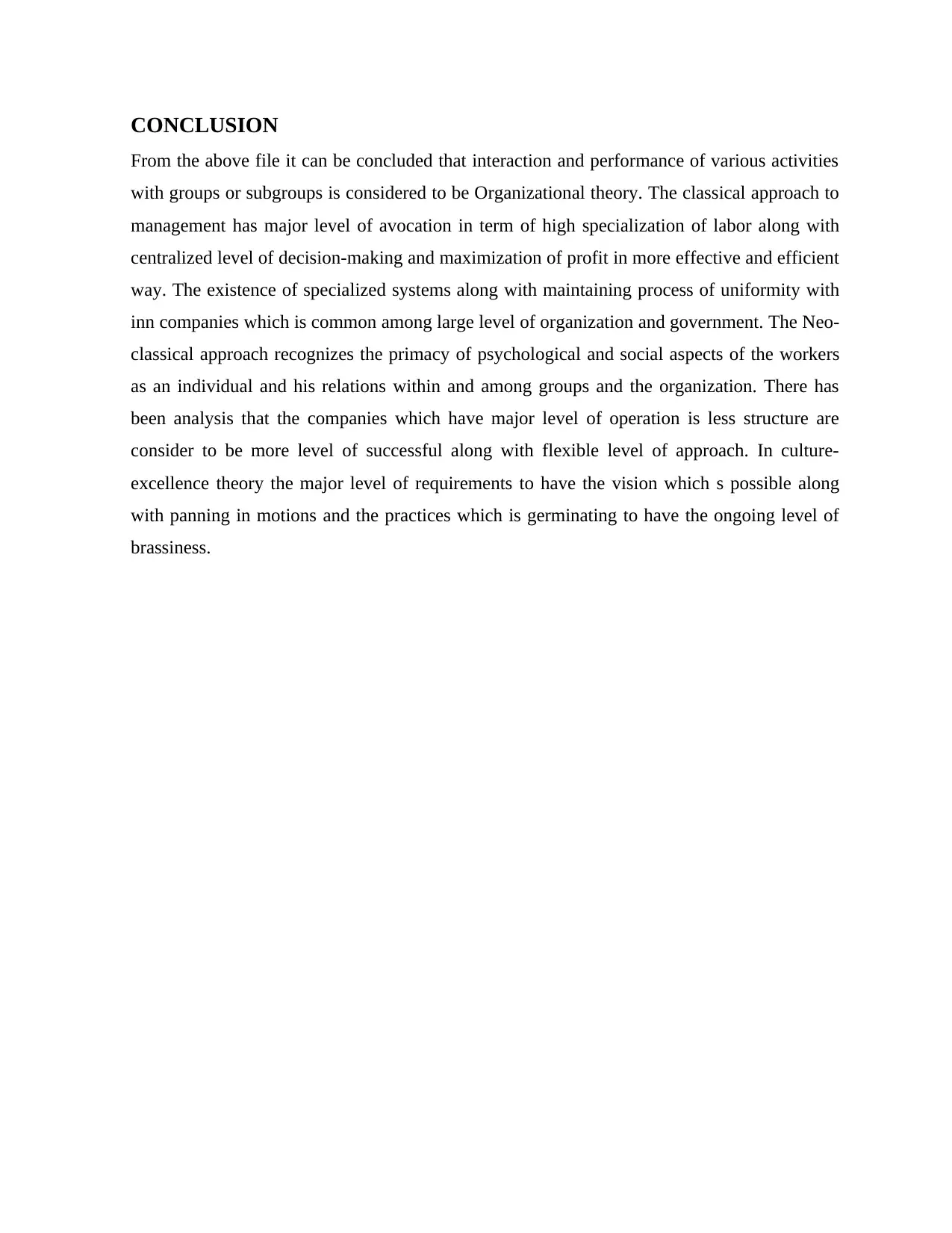
CONCLUSION
From the above file it can be concluded that interaction and performance of various activities
with groups or subgroups is considered to be Organizational theory. The classical approach to
management has major level of avocation in term of high specialization of labor along with
centralized level of decision-making and maximization of profit in more effective and efficient
way. The existence of specialized systems along with maintaining process of uniformity with
inn companies which is common among large level of organization and government. The Neo-
classical approach recognizes the primacy of psychological and social aspects of the workers
as an individual and his relations within and among groups and the organization. There has
been analysis that the companies which have major level of operation is less structure are
consider to be more level of successful along with flexible level of approach. In culture-
excellence theory the major level of requirements to have the vision which s possible along
with panning in motions and the practices which is germinating to have the ongoing level of
brassiness.
From the above file it can be concluded that interaction and performance of various activities
with groups or subgroups is considered to be Organizational theory. The classical approach to
management has major level of avocation in term of high specialization of labor along with
centralized level of decision-making and maximization of profit in more effective and efficient
way. The existence of specialized systems along with maintaining process of uniformity with
inn companies which is common among large level of organization and government. The Neo-
classical approach recognizes the primacy of psychological and social aspects of the workers
as an individual and his relations within and among groups and the organization. There has
been analysis that the companies which have major level of operation is less structure are
consider to be more level of successful along with flexible level of approach. In culture-
excellence theory the major level of requirements to have the vision which s possible along
with panning in motions and the practices which is germinating to have the ongoing level of
brassiness.
Secure Best Marks with AI Grader
Need help grading? Try our AI Grader for instant feedback on your assignments.
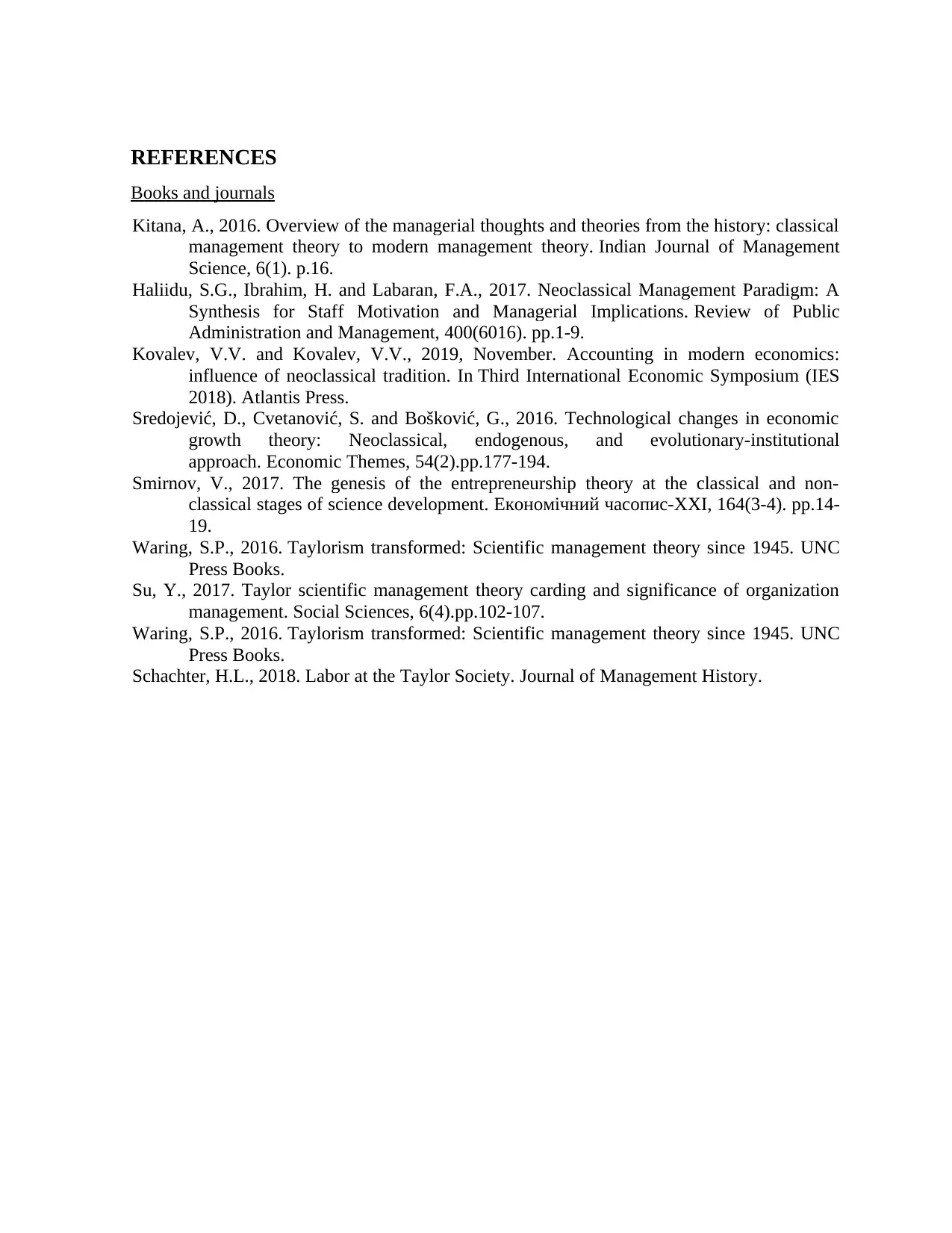
REFERENCES
Books and journals
Kitana, A., 2016. Overview of the managerial thoughts and theories from the history: classical
management theory to modern management theory. Indian Journal of Management
Science, 6(1). p.16.
Haliidu, S.G., Ibrahim, H. and Labaran, F.A., 2017. Neoclassical Management Paradigm: A
Synthesis for Staff Motivation and Managerial Implications. Review of Public
Administration and Management, 400(6016). pp.1-9.
Kovalev, V.V. and Kovalev, V.V., 2019, November. Accounting in modern economics:
influence of neoclassical tradition. In Third International Economic Symposium (IES
2018). Atlantis Press.
Sredojević, D., Cvetanović, S. and Bošković, G., 2016. Technological changes in economic
growth theory: Neoclassical, endogenous, and evolutionary-institutional
approach. Economic Themes, 54(2).pp.177-194.
Smirnov, V., 2017. The genesis of the entrepreneurship theory at the classical and non-
classical stages of science development. Економічний часопис-ХХІ, 164(3-4). pp.14-
19.
Waring, S.P., 2016. Taylorism transformed: Scientific management theory since 1945. UNC
Press Books.
Su, Y., 2017. Taylor scientific management theory carding and significance of organization
management. Social Sciences, 6(4).pp.102-107.
Waring, S.P., 2016. Taylorism transformed: Scientific management theory since 1945. UNC
Press Books.
Schachter, H.L., 2018. Labor at the Taylor Society. Journal of Management History.
Books and journals
Kitana, A., 2016. Overview of the managerial thoughts and theories from the history: classical
management theory to modern management theory. Indian Journal of Management
Science, 6(1). p.16.
Haliidu, S.G., Ibrahim, H. and Labaran, F.A., 2017. Neoclassical Management Paradigm: A
Synthesis for Staff Motivation and Managerial Implications. Review of Public
Administration and Management, 400(6016). pp.1-9.
Kovalev, V.V. and Kovalev, V.V., 2019, November. Accounting in modern economics:
influence of neoclassical tradition. In Third International Economic Symposium (IES
2018). Atlantis Press.
Sredojević, D., Cvetanović, S. and Bošković, G., 2016. Technological changes in economic
growth theory: Neoclassical, endogenous, and evolutionary-institutional
approach. Economic Themes, 54(2).pp.177-194.
Smirnov, V., 2017. The genesis of the entrepreneurship theory at the classical and non-
classical stages of science development. Економічний часопис-ХХІ, 164(3-4). pp.14-
19.
Waring, S.P., 2016. Taylorism transformed: Scientific management theory since 1945. UNC
Press Books.
Su, Y., 2017. Taylor scientific management theory carding and significance of organization
management. Social Sciences, 6(4).pp.102-107.
Waring, S.P., 2016. Taylorism transformed: Scientific management theory since 1945. UNC
Press Books.
Schachter, H.L., 2018. Labor at the Taylor Society. Journal of Management History.

1 out of 12
Related Documents
Your All-in-One AI-Powered Toolkit for Academic Success.
+13062052269
info@desklib.com
Available 24*7 on WhatsApp / Email
![[object Object]](/_next/static/media/star-bottom.7253800d.svg)
Unlock your academic potential
© 2024 | Zucol Services PVT LTD | All rights reserved.





